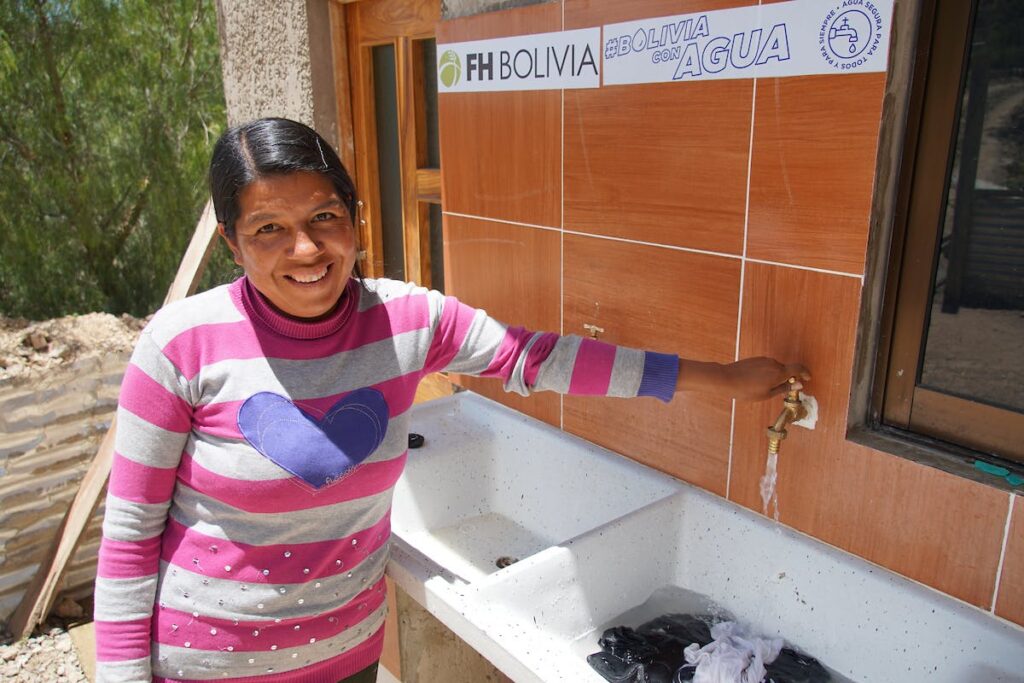Silda is a young mother who lives in the community of Villa Margarita in Bolivia. She is married and has one child, Alex, who is 13. Until recently, her life was difficult and much of her day revolved around finding and hauling water needed for her family and tasks at home.
But a matching program through Food for the Hungry (FH) changed all that, and things are very different today for Silda, her family, and her neighbors.

“Before last December, the adults in our community had to invest a very great deal of time in carrying water each week. The water we could access was not good quality, but still we had to measure out what we used and conserve it carefully,” Silda explained. “We could never think of water as something we could use freely.
“It was so hard to live life concerned that we would not have enough water to drink, wash our hands, cook, or do the laundry. We often did not have money to purchase water, so we had to ask our neighbors to share theirs,” she said. “And some got mad at us for asking.”
Silda’s life began to change when FH came to her community in 2018. Her son started participating in child sponsorship, and she joined a savings group established by FH.
“We met once a week. I learned about project management and saving money as a group so we could meet our needs,” she said.
A Plan to Transform Life in Bolivia
Meanwhile, the concept of Bolivia con Agua (BcA) was taking form. COVID-19 battered Bolivia with a high number of deaths. With hand-washing taking on life-or-death importance, provision of low-cost, consistent water supplies became vital. That’s when FH Bolivia took a lead in forming a consortium of five non-government organizations (NGOs) that shared the dream of giving water to the most vulnerable people in Bolivia.
The organizations with the dream included FH, Water For People Bolivia, Habitat for Humanity, Aguatuya, and Fundación Natura Bolivia. And the dream didn’t stop there; word spread quickly of the effort among Bolivian government and business leaders as well.The plan was very ambitious and costly. Partners on the ground were able to fund much of the work, but there were significant gaps that could have kept the project from reaching its full potential.
The NGO consortium worked in alliance with government and business leaders to obtain promises for funding to fill the gaps. FH then agreed to raise its portion of the funding with the help of supporters both within Bolivia and in North America.
Partnership Opens Matching Opportunities
Around the globe, generous donors often give to FH’s Matching Grant opportunities, which on average worldwide multiply each dollar 22 times. “Matching allows us to develop partnerships like this, and BcA grew out of one of the most complex, well-developed partnerships to date,” explained FH Bolivia Country Director, Marcio Oblitas.
BcA is an innovative fundraising initiative, engaging national and international sources through annual fundraising campaigns.
“Non-government expert organizations bring together their technical, communications, and fundraising teams to address various parts of the water cycle,” Oblitas said, adding that, “FH helped raise funds and leverage the entire partnership.”
That alliance brought together more than 20 organizations and businesses, yet most of the seed money is coming directly from Bolivia.
Families, Schools, Health Centers Receive Clean Water
Work on the project started in 2021, and to date, 3,300 families have received clean water connections. Additionally, schools and health centers have been outfitted with bathrooms for students and patients.

“Clean, safe water is essential to the transformative community work of FH,” Oblitas said, adding that without clean water, progress in education, development of livelihoods, and health services are not possible.
Silda says that Bolivia con Agua has changed the lives of her family and her entire community. They began enjoying clean water service direct to their homes in December 2022.
“We are not worried any more. The children in our community are cleaner, and the people are happier. So many things are easier and better now because we have water. And I have hope. My dream now is that I can finish building my house,” Silda added.
Multiplying Success
In 2021, BcA impacted 1,100 families in 19 communities. That number was nearly doubled in 2022 to 2,200 families and 37 communities. Investment went from $1.1 million in the first year to $1.8 million in 2022.

But Country Director Oblitas emphasizes that there are still thousands of families in Bolivia waiting to gain access to safe water. He says goals for 2023 include impacting 3,000 additional families and investing $2 million more in advancing infrastructure and growing national and international funding.
He then hopes that this highly successful model can be replicated in countries with similar needs.
View More Posts
Farmers Grow Better Together in Rwanda



